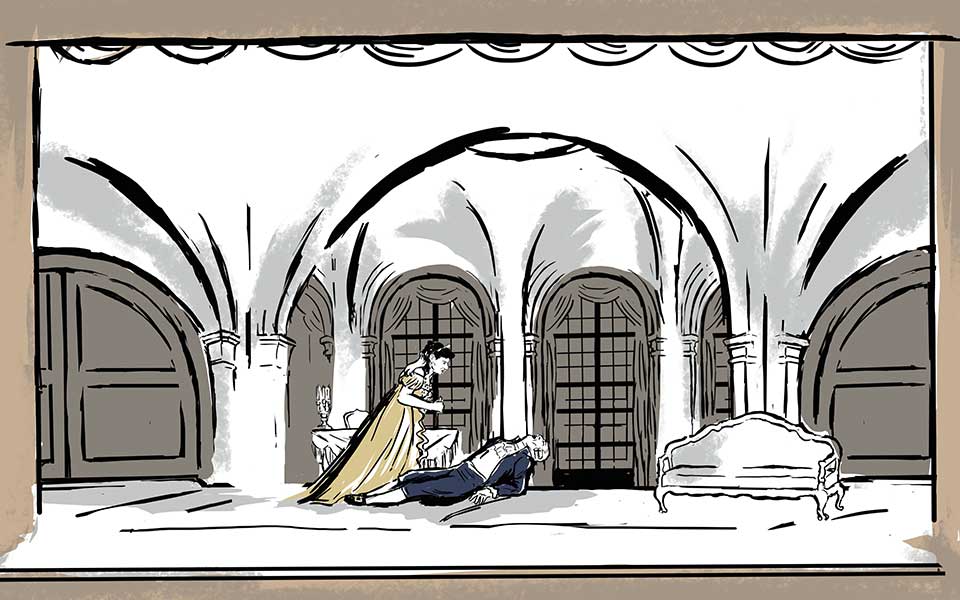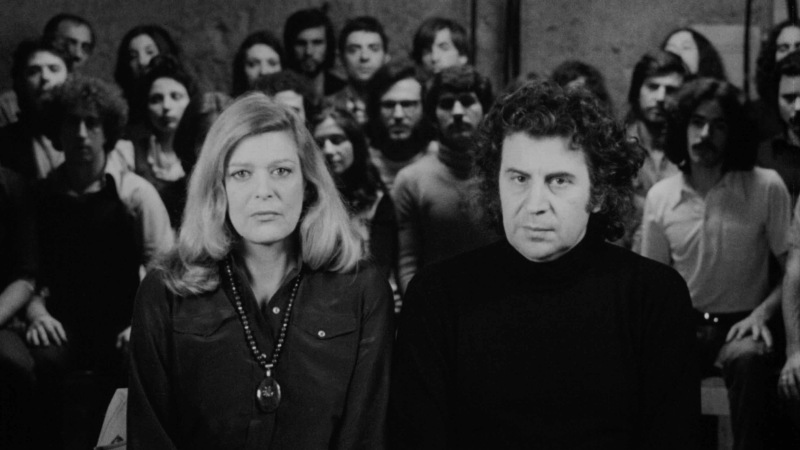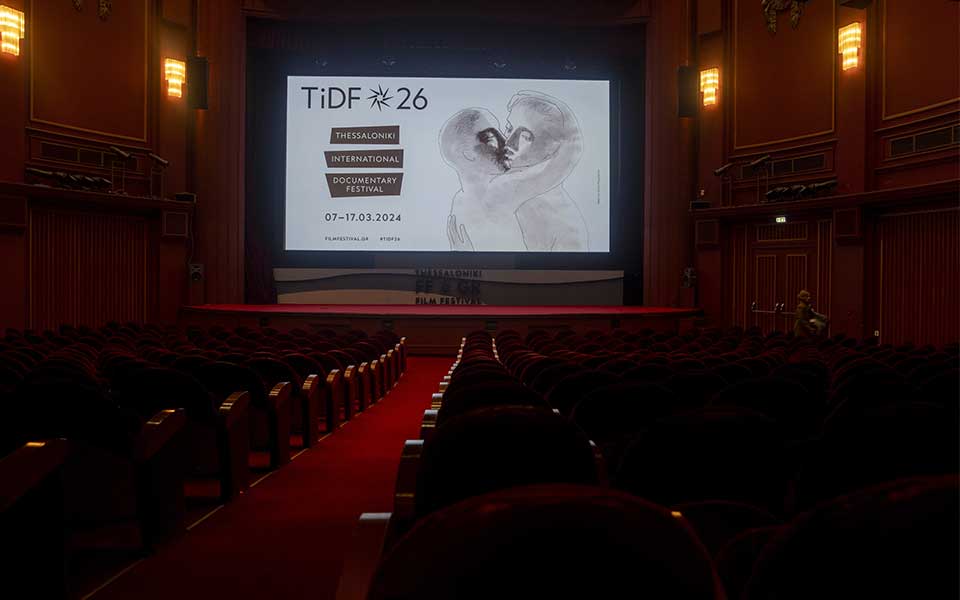What’s happening deep beneath an elite suburb of Athens? How did women from all over the world end up on a remote beach on a North Aegean island? Who was Maria Callas before she became Maria Callas? How does one of Greece’s foremost artists capture identity? And are we giving the Vlachs the respect they deserve?
A series of screenings at this year’s TIDF enhances our love and understanding of Greece, taking us from the ancient world through the revolutionary 1970s and 1980s, through the streets of occupied Athens to an aquatic cave, and to our recent past, sharing footage of major figures of the world of culture in exile from Greece, fighting for freedom through the power of art.
Here are some of the selections to look out for.
Underwonder
What do most of us think about when we hear the name Vouliagmeni, one of Athens’ upscale, seaside suburbs? Probably the beach clubs, the enviable real estate, and for some of us the lake with its year round swimming. The clue to the most interesting thing about Vouliagmeni is in its name – “sunken” in Greek: the lake is the entrance to a vast system of karst caves, a parallel aquatic universe that preserves Greece’s geological past.
In Underwonder, a series of documentaries written and directed by Kostas Karydas and produced by Cosmote TV, we glimpse the world of the passionate and dedicated cave divers mapping this aquatic vastness and exploring Greece’s geological past. Among the team led by cave diver George Vandoros is the underwater photographer and cinematographer Carolin Negrin, whose recorded the footage in the cave. This descent – over 100 meters into the magical world beneath Lake Vouliagmeni – is the first of their four expeditions.
Lesvia
Now that Greece has just become the first Orthodox Christian nation to legalize same-sex marriage, it’s hard to imagine how different the world was just a generation ago, when only in the urban centers of, say, New York or London of the 1970s or 80s some women might have felt comfortable being completely “out.” That is to say, a few world cities…. and a quiet beach on Lesvos: Skala Eressos, home to the poet Sappho (giving us the word Lesbian). In the 1970s, this tiny seaside village became a magnet for Lesbians from all over the world. What was it like? And how did the local community react?
Filmmaker Tzeli Hadjidimitriou grew up on Lesvos and experienced the liberating celebration first hand, awakening her own identity in the process. Lesvia, her inspired and balanced account, traces decades of the international Lesbian life in a small Greek village with candid footage and images of the time, interviews, and reflections. In the process, the viewer considers the meaning of community, identity, patriarchy, and belonging. March 7 marked the wedding of the first Lesbian couple to marry in Greece; March 8th was International Women’s Day – beautiful timing for the screening.
Mary, Marianna, Maria

Is there any name associated with Greece more well-known than Maria Callas? Or for that matter, any name more famous in the world of the arts? In cooperation with the Greek National Opera, the documentary Mary, Marianna, Maria by Michalis Asthenidis and Vasilis Louras takes us to her early years in Athens, when she was Maria Kalogeropoulou, a music student of modest means, threadbare clothing, and spellbinding promise.
These were hard years in Athens; for a performance in Thessaloniki she was paid not cash, but sacks of wheat, lentils, and rice – valuable currency during the occupation. Yet hunger was perhaps the least of her hardships; her family life offered nothing like love, and her peers were not always kind. We marvel at her strength, an intriguing mix of humility in her pursuit of excellence, and confidence in knowing her worth, rejecting a contract with New York’s Metropolitan Opera. When Costis Bastias, founding director of the GNO, invited her to perform Norma at the Ancient Theater of Epidaurus in 1959, her fortunes had risen; she refused payment, diverting it instead to a scholarship foundation. Throughout the film, we rejoice in her triumphs and grace, as our admiration grows, not just of her excellence but of her character.
The Portrait: Yorgos Rorris paints Evaggelos Averoff & Armani the Vlachs
Also on the program are two Greek-centered double features. The Portrait, by Kalliopi Alexiadou and Antonis Simeonidis, is in turn a double portrait. The film follows both the noted contemporary Greek painter Yorgos Rorris, known for his richly-textured, lustrous large-scale oil paintings as well as the psychological depth of his portraits, and his subject, the Greek statesman, benefactor, and author Evangelos Averoff, represented through comprehensive archival material. How does the artist connect with the subject who is long deceased?
The Portrait is screened with Armani the Vlachs. Armani refers to the Aromanians, an ethnic group speaking an eastern romance language of the same name. In Greece, they’re often called the Vlachs. Many notable Greeks were Vlachs (including Averoff). Yet the name can carry a derogatory connotation. Michael Kamakas’ film addresses Vlach identity in the wider context of Greek history and culture.
The Rehearsal & The Owl’s Legacy: Democracy, or City of Dreams

For those interested in contemporary Greek culture and history, The Rehearsal is a rare document. Actress Melina Mercouri and her husband/director Jules Dassin were a magnetic couple, in art and life. They created definitive works together: Never on a Sunday, Topkapi, and Phaedra. In life, they shared a devotion to Greece and to freedom, campaigning against the military Junta while in exile from Greece. The Rehearsal is in part a rehearsal – Dassin is documenting the making of a film about the Athens Polytechnic uprising. This footage is interspersed with newsreels and testimonials, artists read poetry and letters of prison, Mercouri reads a section of Axion Asti, and Theodorakis performs.
Greece’s military dictatorship ended just as Dassin finished the film, which remained unreleased, a valuable document of a pivotal moment. The Rehearsal screens with The Owl’s Legacy: Democracy, or City of Dreams, a 1990 documentary that looks at democracy in the ancient world and how it relates to our contemporary conception.
TIDF26
A complete program, online screenings, and credits for each of the many films at this year’s documentary festival can be found here. If you’re in town but were not fortunate enough to get tickets for the screenings of his work, you can visit “Inside”, a visual meditation by the director, choreographer, visual artist and performer Dimitris Papaioannou, at the MOMus Experimental Center for the Arts, located on the pier near several of the screening rooms.












